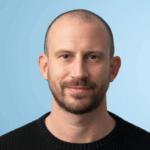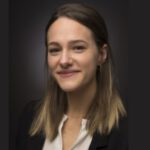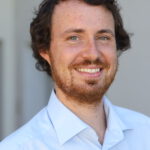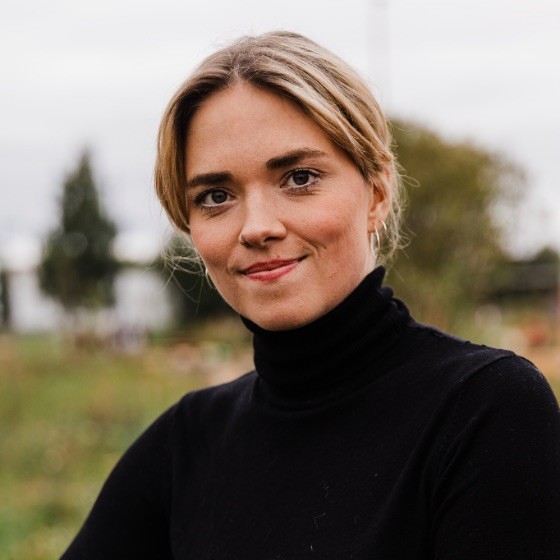SEEP Graduation
Cohort
Career
SEEP Alumni Story | May 12, 2025
Halliki Kreinin
Bridging Research, Community, and Change
After completing her bachelor’s degree in international relations, Halliki Kreinin found herself at a crossroads – working in university administration, grappling with climate anxiety, and searching for a more meaningful path. That search led her to the Socio-Ecological Economics and Policy (SEEP) master’s program at WU. “I started googling around and came across SEEP – and the rest is history,” she says, laughing. But what began as an online search turned into a transformative academic journey.
Today, Halliki is a Senior Research Associate at the Research Institute for Sustainability (RIFS) in Potsdam, Germany. She is currently working on the Horizon 2020 project EU 1.5° Lifestyles, researching how degrowth-oriented lifestyles can be made socially acceptable and politically feasible. “It’s not just about building a career,” she reflects. “It’s about doing something meaningful while surviving in a capitalist system.”
The SEEP program gave her both the academic tools and the practical flexibility to pursue that vision – from a Blue Book Traineeship at the European Commission to completing a PhD at the WU Institute for Ecological Economics. Her research has taken her to the European Parliament, the Beyond Growth Conference, and other influential platforms. For Halliki, the real value of SEEP lies in the groundwork it provided: “Everything I’ve been working on has really built on the foundations we laid during the program.”
Though she jokes that she still needs a few more “highlights,” her journey illustrates how SEEP can launch students into impactful, interdisciplinary, and values-driven careers – while staying grounded in the realities of today’s social and ecological challenges.
From Mentorship to Mastery
“One of the reasons I chose SEEP was the excellent professors teaching it,” Halliki recalls. She highlights the influence of renowned academics like Sigrid Stagl, Clive Spash, Andreas Novy, Manuel Scholz-Wäckerle and Barbara Haas, whose theoretical contributions and mentorship helped shape her academic journey. Halliki especially emphasizes the impact of Viviana Asara’s course, which introduced her to environmental labor studies and sparked the research questions that would later define both her master’s thesis and PhD.
What sets SEEP apart isn’t just the quality of its teaching, but also the adaptable skillset it provides its students. Halliki describes how the program equipped her with a strong vocabulary and a solid understanding of political and economic systems. “One of the strengths of the program is that you can adapt it to different directions,” she explains – whether applying for a Blue Book Traineeship, pursuing doctoral studies, or working on interdisciplinary research projects. SEEP’s balance of theory, critical thinking, and applied methods proved vital to her path in academia.
She also highlights the importance of the soft skills gained during the program: working in teams, debating ideas, and presenting arguments clearly. These are skills, she notes, that continue to matter deeply in collaborative research settings. “The program offers a lot of opportunities for interdisciplinary work,” she says. “And if you go into research and take part in larger European projects, that’s really useful.”
After SEEP, Halliki felt well-prepared to enter the world of academic conferences and doctoral study. The program’s structure – combining theoretical depth with practical engagement – shaped her approach to academia, instilling a sense of purpose beyond personal achievement. “I think it’s really important to have something beyond your ego driving your research – a desire to understand the world, and maybe even to change it.” For her, teaching was a particularly meaningful part of academic life, she reflects, recalling the students who still reach out years later.
At the same time, Halliki urges a critical awareness of academic culture. “Academia is often very hierarchical. It’s easy to get caught up in this capitalist logic that you only have value if you reach the top of some hierarchy,” she notes. Instead, she encourages building genuine relationships and staying curious. “It’s about having a broader perspective, beyond yourself, beyond your H-index or publication count. Those are the kinds of values I think matter.”
A Community That Understands
“One of the most powerful and beautiful aspects of the program,” Halliki recalls, “was the strong and supportive community.” Whether facing professional challenges or personal setbacks, she found immense support in having people around her who could genuinely relate. “Through SEEP, I was connected to people who truly understood my worries and concerns.”
When asked to describe the program in a single sentence, Halliki responds: “A network of radical friends and two years in Vienna.” For her, the true value of SEEP lies in the people. “What you don’t get without the program is access to the professors and the amazing people you meet in your cohort.”
This spirit of mutual support extended into her academic life as well. “I really enjoy the collaborative side of research – working in groups, cooperating, writing together. I find writing papers alone boring,” she admits. “But when it’s a cooperative process, it becomes much more enjoyable – and the outcomes are better, too.”
At the same time, Halliki encourages students to step outside the SEEP academic bubble. “While it’s a comforting space, especially in times of climate crisis, it’s essential to learn how to communicate effectively with people beyond it.” Engaging with the everyday concerns of others and connecting theory to real-world experiences, she notes, is both a challenge and a vital skill in the field of socio-ecological economics.
Advice to SEEP Students: Slow Down and Enjoy the Moment
When asked what advice she would give to SEEP students, Halliki emphasizes the importance of balancing academic life with simply living: “Spend time with family and friends, go out, smell the flowers, listen to the birds and don’t stress so much about everything all the time.” Reflecting on her own experience, she admits she often felt overwhelmed by the pressure to do it all. Her encouragement to current students is to appreciate the unique moment they’re in: “Your master’s – this time with all the interesting people around you in Vienna – you’ll never get that time back. It was one of the best times for me.”
In a program full of passionate individuals juggling studies, jobs, and activism, Halliki’s advice is simple yet powerful: “Maybe just… take it easy. We live in this productivist mindset and society, and we’re doing too much all the time. Doing the SEEP master’s is already enough.”
Whether it’s lying in a park watching the clouds or stepping back from the constant push to achieve, Halliki reminds SEEP students to protect their energy – and to enjoy the ride.
Author: Daria Agarkova
You might also like to read

Sebastian Linder
Sustainability Expert
From SEEP to the Vienna Economic Chamber. Sebastian Linder shares how he built a sustainability program from the ground up and turned quiet beginnings into a city-wide initiative.

Stella Eckl
Consultant
At EY denkstatt, Stella Eckl works where business meets transformation. She shares how consulting can be a platform for change.

Roman Hausmann
Researcher
From juggling lectures to shaping the next generation of critical thinkers, Roman Hausmann shows how research and teaching can become powerful tools for real-world transformation.

